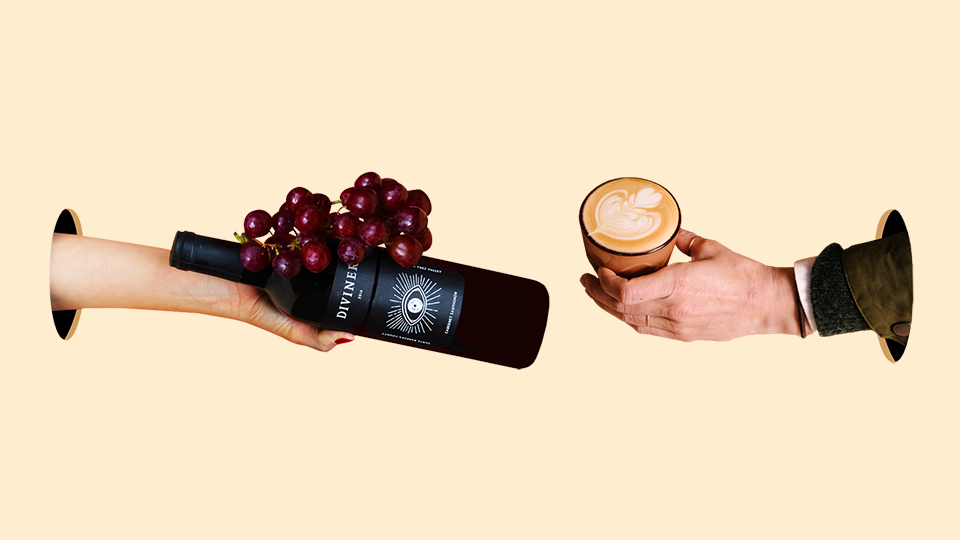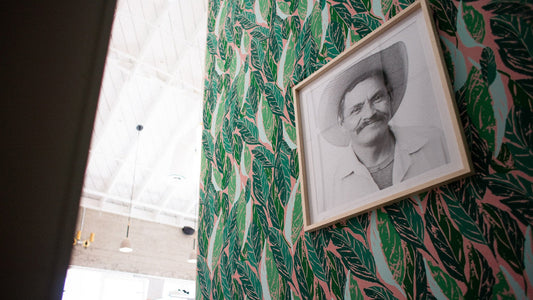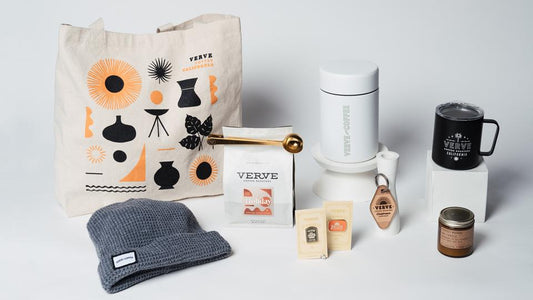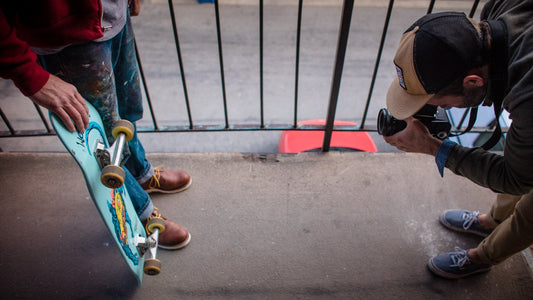We are partnering with Winc this Summer to offer discounts and giveaways on coffee and wine.
While many wine-drinkers are familiar with the nuances and complexities of wine, many people are only just now exploring the different varieties and region- and process-specific influences that impact the way coffee tastes. Beyond the fact that both coffee and wine are made from fruit, there are countless commonalities between two of the world’s favorite beverages -- including everything from how we taste to flavor profiles to the importance of terroir.
We sat down with our co-founder Colby Barr and Winc’s winemaker Bobby Daugherty to discuss the similarities between coffee and wine, common flavor profiles, and tips for how to select and taste both of these beloved beverages at home like a pro.

Colby Barr

Bobby Daugherty
What are the big similarities between growing coffee fruit and growing grapes for wine?
Colby Barr: Growing up in a family that farmed wine grapes in Northern California, I’ve often talked about this with my father who studied viticulture at UC Davis. Wine grapes and coffee have a lot in common!
There are many different cultivars of coffee, ranging from bourbon to pacamara to tabi, just to name a few. These cultivars taste different (similar to the way a pinot noir tastes different than a merlot) and grow best in certain regions and growing conditions, similar to grape cultivars. Like all world-class agricultural products, terroir is paramount. You need to have the right address on Earth depending on what you’re looking to create. This goes for both wine grapes and coffee.
Beyond the importance of the region, the farmers themselves are incredibly important. You need a farmer who is passionate about what they do and who truly loves farming -- there is no substitute for this. They will take care of the plants every day and ensure the highest quality. They’ll also decide the critical moment of harvest. In coffee, like wine, it is critical yet subjective when to harvest and is always a balance of sugar and acidity.
Finally, there’s the processing of the fruit -- like wine, coffee processing involves fermentation, though not to produce alcohol. Fermentation does have a huge impact on the final coffee’s taste and there are many ways to approach this depending on the producer’s preferences and styles.
Bobby Daugherty: As Colby mentioned, one of the biggest similarities is the incredible diversity of beans and grapes. Not only do both have seemingly endless varieties, they have multiplicity in the way in which they are processed. The result is an inexhaustible range of flavors and styles.

Coffee cherries picked during peak season.

The almighty wine grape during harvest.
Bobby, how has learning about coffee has helped you in your career as a wine expert?
BD: Both beverages require a measured approach to production and analysis. There is a kinship there, though the flavor compounds and methods are very different. Coffee, to me, is a reminder of what we do: create satisfying experiences for people to enjoy.
What parallels do you see between coffee and wine from a tasting perspective?
CB: Funny enough, the original coffee tasting wheel was inspired by wine’s aroma wheel that was created at UC Davis in the 1980s. The idea was to create a common language that could be used by tasters to describe coffee’s complex flavors. On top of that, the Specialty Coffee Association recently partnered with UC Davis to create an updated tasting wheel to hone this even further.
When tasting coffees, you may hear descriptors of different types of stone fruits, aromatics of perhaps basil, maybe a sparkling minerality, a silky mouthfeel with a complex and lingering finish, and always the descriptions of sweetness, acidity and clarity. Even though there are lexicons and “norms”, tasting is ultimately a subjective endeavor and like wine, people will like and dislike individually whether it is because of the cultivar, the region, or the approach of the winemaker or coffeemaker themselves.
Speaking of tasting, what are the steps one should take when wine tasting at home?
BD: The most important step is comfort. If your objective is to enjoy the wine, that is the only requirement. If a more serious tasting is your ambition, make sure the environment is free of aromas, you have clean and proper glassware, and a pen and paper to document your findings.
What are the steps one should take when choosing coffee beans to brew at home?
CB: The most important thing you can do is buy high quality coffee. That may seem obvious, but there is a lot of terrible coffee out there and you can’t improve coffee once it is picked. It’s really important to buy coffee from roasters that work directly with producers and that focus on quality. Next, you have to learn what you like. If you have a favorite cafe, talk to the baristas! If you buy online, don’t hesitate to call or send a quick note to the roaster asking for their opinion. Tell them what you normally like and don’t like and then start exploring the space.
We at Verve roast lighter than many coffee companies because we want you to taste the intrinsic qualities of the coffee and not overwhelm and smother those unique, desirable qualities in roast. That said, we do have a range of roast profiles and coffee types to choose from - you may like balance and chocolate or you may like fruit-forward, the options are really endless.
Colby, what’s your favorite coffee offered on Verve right now and Bobby, what’s your favorite wine available on Winc?
CB: This is a tough one! Of our blends, which are available year-round, my favorite is probably The 1950. It’s one of our lighter blends and made up of high elevation Ethiopian coffees — which by the way, is the birthplace of all coffee on Earth. It has a brown sugar sweetness paired with a lime and nectarine vibrancy, and has a complex and lasting finish. I call it our crossover coffee because it sits right between the rest of our blends and our single origins. If you want more balance and a bit more roast, head deeper into our blends. If you want a bit more uniqueness and pop then jump up into our Single Origins, which are limited and come and go with inventory.
BD: Our 2020 Debts & Lessons Riesling. The grapes were grown in stone-strewn vineyards in Monterey County that yield flavors of green apple, citrus, wet stone, and tea. On the palate, a crisp acidity and balancing sugar provide a lengthy wine that both novice and veteran drinkers can share and enjoy.
Colby, what is your favorite type of wine?
CB: I actually like my wines like my coffee. Clarity of flavor is most important to me and then a sliding balance of acidity and sweetness. I love minerality, though I don't always have to have it. I'm not really into anything drying (in coffee that is a big no-no) and have moved away from the weightier wines but can appreciate them on occasion. I do like natural wines and am also drawn toward the lower sugar/alcohol movement. So with all of that, maybe Bobby and the Winc team can tell me exactly what I would like! ;)
Bobby, how do you like your coffee and do you have any favorite types of coffee?
BD: I prefer my coffee black. This helps to discern the aromas and flavors without distraction. I’m especially fond of a mid-afternoon espresso.

What’s your favorite word or term used to describe wine and coffee, respectively?
BD: “Sexy.” It’s seldomly used by winemakers, but describes a red wine that is easy to drink, elegant, with velvety tannins and pretty aromas like flowers and fresh fruit.
CB: ”Complexity.” To me this is the bonus point for any coffee. Complex flavors in coffee typically come from the very highest grown coffees which are what we are seeking in many of our best coffees.
Finally - we’re going to play a game of fill-in-the-blanks!
Oenophiles, here’s some help to find your new favorite Verve coffee origins:
- If you like pinot noir, you should try Colombian, Guatemalan or Costa Rican coffee
- If you like an oaky chardonnay, you should try Brazilian
- If you like a merlot, you should try Panamanian
- If rose is your go-to, you should try Ethiopian
- If you love dry sauvignon blanc, you should try Mexican
- If you love a fruity riesling, you should try Honduran
- If you love a deep syrah, you should try a natural/dry-processed coffee
- If you love a cabernet sauvignon, you should try Kenyan or our Asia-Pacific coffees
Coffee-lovers, here are your Winc wine recommendations from Bobby:
- If you like a coffee that has earthy, vegetal or herb flavors, try 2019 Baseline Syrah
- If you like your coffee with chocolate, sweet, sugary flavor notes, try 2018 Likelihood of Confusion Zinfandel
- If you prefer coffee to have notes of berry or stone fruit, try 2020 Keep it Chill Gamay
- If you like coffees with more citrusy fruit flavors, try 2020 Point de Passage Sauvignon Blanc
- If your favorite coffees have floral flavors, try 2020 Wonderful Wine Co. Malvasia Bianca
- If your favorite coffees have spice flavors (nutmeg, ginger, coriander, cinnamon), try 2019 Ville Basse Red Blend
- If you like a light roast coffee, try 2019 Folly of the Beast Pinot Noir
- If you prefer a medium roast coffee, try 2020 Sister Snake Grenache
- If you love a dark roast coffee, try 2019 Chop Shop Cabernet Sauvignon
- If you love your coffee with cream and sugar, try 2018 Rosa Obscura Red Blend
- If you prefer your coffee black, try 2020 Mercana Cabernet Sauvignon




